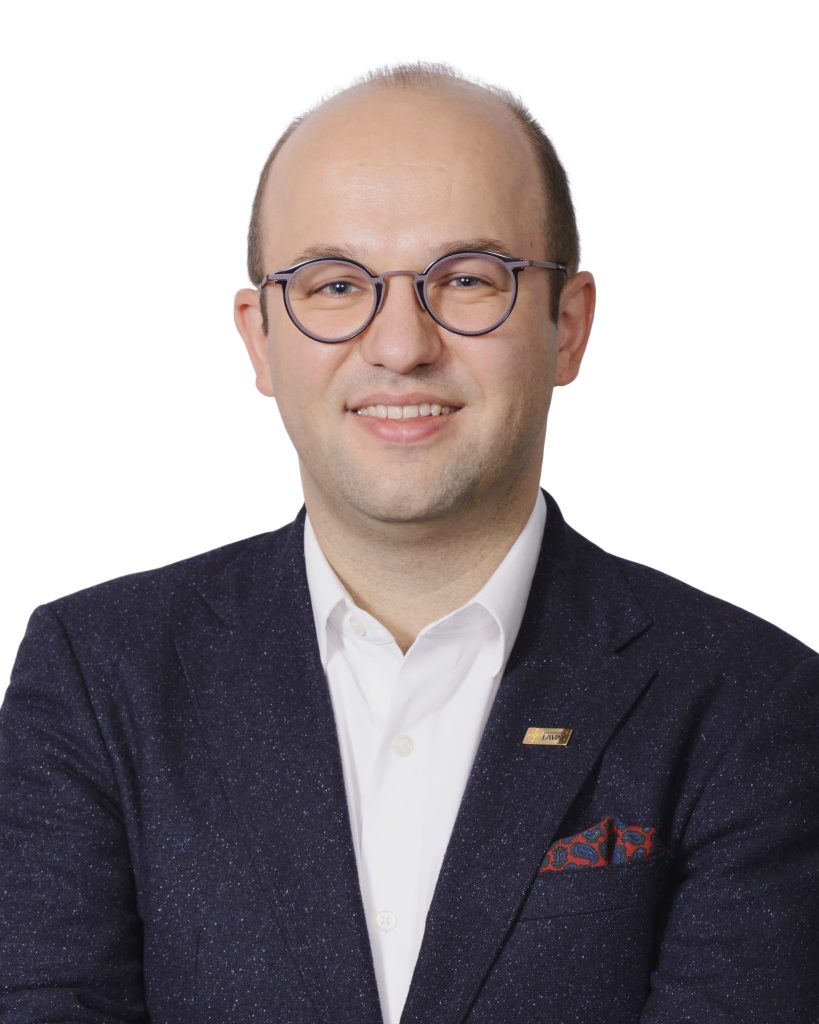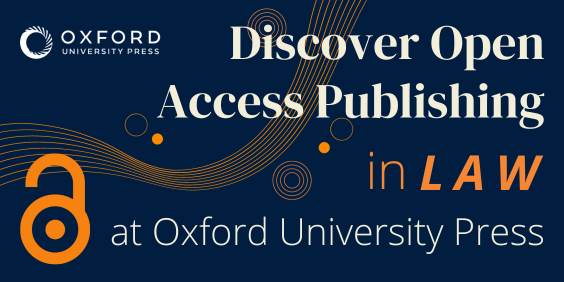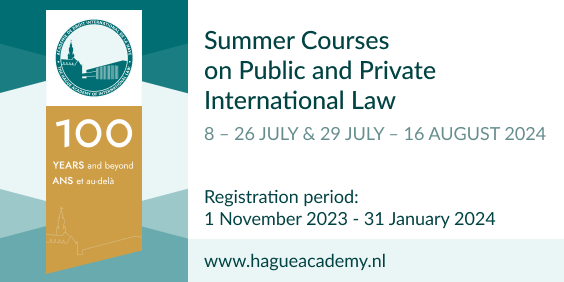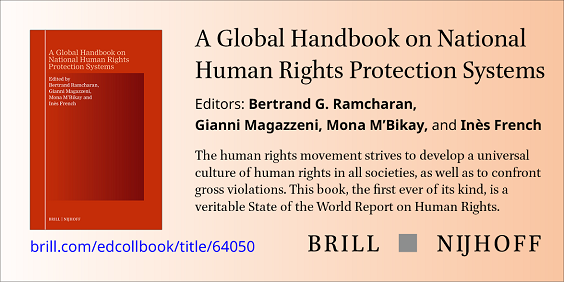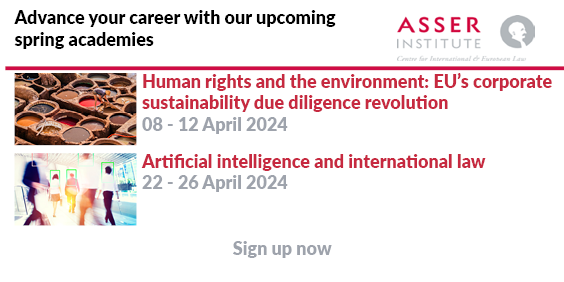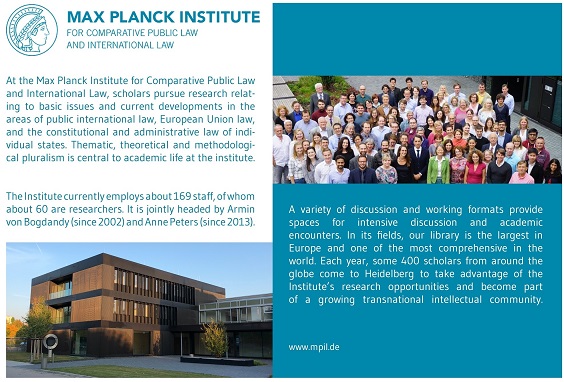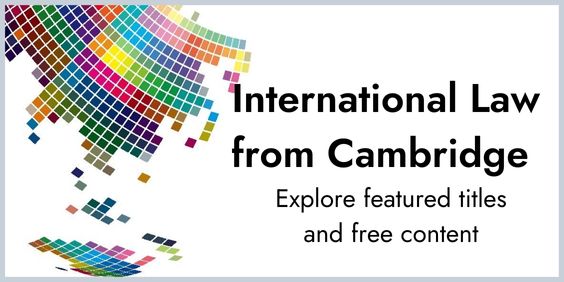ESIL Newsletter – Autumn 2023
Editors: Inga Martinkute (Vilnius University) and Helmut Aust (Freie Universität Berlin)
 In this issue
In this issue
1. Message of the President
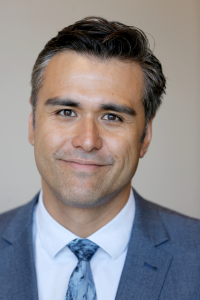
Dear ESIL members,
At the 18th Annual Conference in Aix-en-Provence, I had the honour to become the new President of the European Society of International Law. It is a genuine privilege to serve as President, and I am much obliged to my fellow colleagues on the Board for the trust they have shown in me. I look forward to working closely with them all in the coming two years, as we work together for the advancement of our Society and its members.
I take over as President after our long-serving colleague Pierre d’Argent, who has led our Society through a period of renewal and change following the COVID-19 pandemic that has profoundly affected the world. Under Pierre’s leadership, the Society has returned to its pre-pandemic size (in terms of members) and taken on a number of exciting initiatives. These include the launch of our vibrant ESIL Early-Career Network, as well as more wide-ranging commitments to a more sustainable, inclusive Society. With a keen vision for the future foundations of the European Society of International Law as it celebrates its 20th anniversary in 2024, he has further laid the groundwork for the next twenty years with initiatives that will continue to develop during my own term. Pierre, we are all grateful to you for your service, your leadership, and your collegiality. Merci de tout coeur.
Pierre was, of course, assisted throughout his term by the industrious and talented members of our Secretariat during a period of transition. Despite a successful promotion at the EUI, where she is based, Joyce Davies returned to the helm of the Secretariat in order to support the Society as we moved forward, where she works closely with the excellent Maria Grazia Dusina. With only two members of staff, the Secretariat serves our diverse and broad membership with calm professionalism and is the backbone of our Society. We are most grateful.
In Aix-en-Provence, the Society’s Executive Committee has been partially renewed. After many years as Secretary-General and a two-year term as Vice-President, Veronika Bílkova retires with our great appreciation. Her candour and sharp eye, her integrity and transparency, will be missed. Christian Tams and Neha Jain remain as Vice-Presidents, for which I am very appreciative, and are now joined by Ganna Yudkivska. Both an academic and a practitioner, and a former international judge, Ganna will bring an invaluable link to international legal practice to the Executive Committee. My successor as Secretary-General is Adriana Di Stefano, who pulled off a fully online Research Forum during the heights of the COVID-19 lockdowns. Besides a warm welcome, I am pleased to announce that under her leadership, Catania will host an in-person ESIL Research Forum in 2025. I am very privileged to serve alongside this wonderful group of individuals.
Sandrine Maljean-Dubois has now ended her mandate as a co-opted Board member after the resounding success of the ESIL 2023 Conference held in Aix-en-Provence. One of the largest annual conferences ever, Sandrine and her colleagues in Aix-en-Provence convened a high-quality conference, living up to their chosen theme of fairness through a welcoming, inclusive format, both in the panels and the social activities they organised. Sandrine served for four years on the Board, rather longer than most co-opted conference organisers, having graciously postponed the Aix-en-Provence gathering for two years in response to the pandemic. Tu vas nous manquer, chère Sandrine!
Inga Martinkutė continues to serve as our liaison for the organisation of the 19th Annual Conference, which will take place in Vilnius in 2024, and we are pleased to welcome Helmut Aust, one of the organisers of the 20th ESIL Annual Conference, to be held in Berlin in 2025. I am also pleased to announce that, in Aix-en-Provence, the Board decided to convene the 2026 Annual Conference in Lisbon, and Armando Rocha will be co-opted to the Board for two years prior to the conference.
ESIL continues to visit new locations and we hope to continue to extend the footprint of the Society across Europe and in the world. In spring 2024, our next Research Forum will take place in Nicosia, on ‘Revisiting Interactions between Legal Orders’. The Call for Papers generated nearly 200 applications, a new record: we are confident that the 2024 Research Forum will continue to benefit early-career scholars within the Society. The Board is thankful to Aristotelis Constantinides and to Ioanna Hadjiyianni for their willingness to host the Society in Cyprus.
The Society also has organised some key joint events in recent months. On 20 September 2023, ESIL collaborated with the African Society of International Law under the leadership of Ana Salinas, fellow Board member and President of the Spanish Association of Professors of International Law and International Relations to bring together a Joint Workshop for Young Researchers on ‘International Law and International Relations as a Response to the Challenges of the New Globalisation’. Other ESIL joint events included: an event hosted by Católica Lisbon on Climate Change Law & Litigation; an event hosted by Ivane Javakhishvili Tbilisi State University on ‘Emerging Issues of Relationship between Humanitarian Law and International Human Rights Law’, and a fully online webinar in collaboration with the ESIL Interest Group on the Law of the Sea on ‘the BBNJ Treaty—A Preliminary Assessment’.
New events and initiatives remain under discussion and will be announced in our Newsletter as well as on the ESIL website.
As this Newsletter goes to press, events of global importance are unfolding in the newspapers. Our field requires constant engagement and critique if international law is to contribute positively to our world. Our role, as scholars and professionals practising international law, is to call attention to its promise and its pitfalls forthrightly. We will strive to maintain the Society’s relevance in contributing to such debates.
On behalf of my colleagues on the Board, I wish all our members a very fruitful start to the academic year, and I also wish our members who are not primarily scholars of international law a very successful autumn period. We take great pride in our Society being a site for engagement and interaction in relation to international legal scholarship and practice, as well as for robust critical reflection on the role of law in international society.
I much look forward to working with all of you in the course of the next two years.
Gleider Hernández
ESIL President
2. Guest Editorial by Vladyslav Lanovoy: The Importance of International Courts and Tribunals in a Troubled World
There was a time, not that long ago, when the Report of Judgments, Advisory Opinions and Orders of the International Court of Justice (ICJ or the Court) was a few pages long and the Court had a single case on its docket (1977). In contrast, the last available reports for 2019 and 2020 were 1520 and 1098 pages long, respectively. The Court’s docket today, with no less than 20 cases, covers a variety of issues, including sovereign immunities, genocide, torture, racial discrimination, maritime delimitation, territorial sovereignty, and climate change. Perhaps the most important metric is that more than a quarter of States members of the United Nations are currently involved in proceedings before the principal judicial organ of the United Nations. Over the last five years, the Court has delivered judgments on the merits in respect of disputes involving States from all over the globe, including Egypt, Bahrain, Bolivia, Chile, Colombia, Costa Rica, Equatorial Guinea, France, India, Kenya, Nicaragua, Pakistan, Qatar, Saudi Arabia, Somalia, and the United Arab Emirates. In addition, the Court has delivered multiple judgments on preliminary objections and orders on provisional measures. In a similar vein, while the year has not yet finished, the Permanent Court of Arbitration (PCA) is close to surpassing its own record in terms of the number of cases administered in a given year. As the PCA prepares to commemorate its 125th anniversary, the United Nations General Assembly has recently adopted its resolution 77/322 encouraging States to accede to The Hague Conventions for the Pacific Settlement of International Disputes of 1899 and 1907 and to make use of the services of the PCA. Other dispute settlement mechanisms, including the International Tribunal for the Law of the Sea (ITLOS), the Inter-American Court of Human Rights (IACtHR), and the European Court of Human Rights (ECtHR), are also very busy. For instance, in the recent advisory proceedings before ITLOS, 34 Contracting Parties to the United Nations Convention on the Law of the Sea (UNCLOS) and 9 organizations participated in the written proceedings, while 35 Contracting Parties and 4 organizations made oral statements. The diversity of States taking part in the proceedings is as impressive as the diversity of views they have expressed.
States, intergovernmental organizations, but also individuals and non-governmental organizations, appear to be turning en masse to international courts and tribunals in respect of a wide range of issues and relief sought, in both contentious and advisory proceedings. This unprecedented growth in the activity of international courts and tribunals could be regarded as both a sign of a systemic crisis but also of the maturity of the international legal order. A systemic crisis, because it shows that States are increasingly unable to settle their disputes through the ordinary processes of bilateral or multilateral negotiations or other diplomatic means. The disagreements among them can no longer be explained merely by reference to historical injustices or the global north-south divide. This is visible both in contentious and advisory proceedings. For instance, the arguments tabled in some of the most high-profile advisory proceedings over the years (e.g., Kosovo or Chagos) show profound differences of opinion among States on the scope and meaning of, and the relationship between, some of the most fundamental obligations under international law.
At the same time, the marked increase in the use of international courts and tribunals in contentious proceedings is a sign of the maturity of the international legal order which lacks a compulsory system of dispute settlement. International courts and tribunals have also been asked to provide guidance to the international community on fundamental multilateral challenges that concern this and future generations, such as climate change. This demonstrates the level of trust that the international community has placed in them, at a time when the foundations of international law are being challenged by a small, yet highly visible minority of States, and when the international institutions designed to address matters of international peace and security seem to be paralyzed. International courts and tribunals have a critical role to play, now more than ever, as guardians of the international legal order. To that effect, clear and robust legal reasoning in their decisions has the potential to triumph over political and ideological differences, or at least to contribute to the comprehensive solutions that the international community must deploy to fulfill this role and address these challenges.
*Assistant Professor of Public International Law, Université Laval, Canada. E: vladyslav.lanovoy@fd.ulaval.ca
3. Meet an ESIL member – Runar Lie
You can find the video introducing Runar Lie, Postdoctoral Fellow at the Department of Public and International Law at the University of Oslo and winner of the 2023 ESIL Young Scholar Prize for his paper “Ghosts of the Past: The Dominance of Older Treaty Language in International Investment Arbitration”, here.
4. What’s Going On?
 2023 ESIL Annual Conference in Vilnius – CALL FOR PAPERS AVAILABLE!
2023 ESIL Annual Conference in Vilnius – CALL FOR PAPERS AVAILABLE!
The topic of the annual conference is “Technological Change and International Law”. This theme invites participants to reflect on how recent technological advances transform the international community and the main pillars of international law. How, if at all, is new technology changing our perception and practices of international law? What were past international legal responses to technological change? When and how can we regulate new technology at the international level, if at all? Which new technologies need to be regulated at the international level?
The speakers – in six fora panels and twelve agorae – will reflect on a range of topics: “Race as Technology / Technologies of Racialisation in International Law”, “Do we need a new theory of (human) rights adapted to governance by data?”, “Dispute Resolution in Times of Technological Change”, “Technologies of Warfare – International Peace and Security in a Digital Age”, “Rethinking International Law: Digital Sources, Subjects and Sovereigns”, etc.
Further information about the conference can be found here. Proposals must be sent via email to info@esil2024vilnius.lt.
The deadline for the submission of abstract proposals is 31 January 2024.
The Law Faculty of Vilnius University and Vilnius municipality are inviting all international lawyers to Vilnius next year – watch the teaser video!
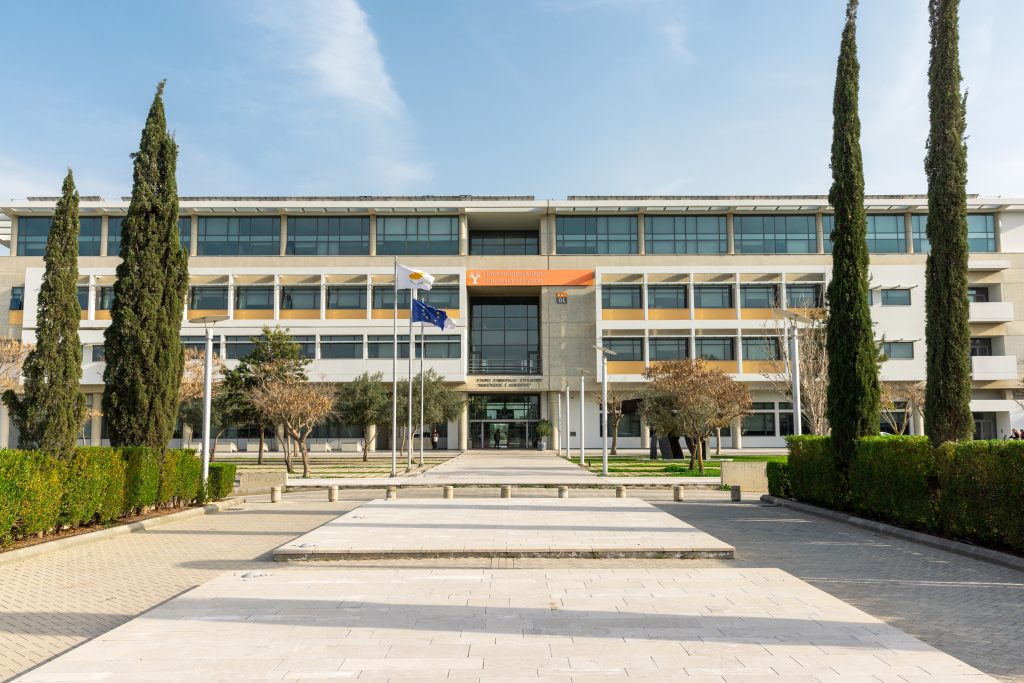 2024 ESIL Research Forum in Nicosia
2024 ESIL Research Forum in Nicosia
The 2024 ESIL Research Forum will take place on Thursday 18 and Friday 19 April 2024 and will be hosted by the Department of Law of the University of Cyprus. It addresses the topic: ‘Revisiting Interactions between Legal Orders’. In light of the urgency and a renewed momentum in delivering global public goods amidst global instability, the 2024 Research Forum aims to explore interactions between legal orders, revisiting the different kinds of interactions and how they emerge and operate. It also aims to unpack analytical frameworks through which to make sense of and assess these interactions.
The Call for Papers is now closed. The deadline for submission of abstracts was 30 September 2023, and the organizers received 193 abstracts, mostly from early career scholars on a variety of themes relating to the interaction between legal orders. The selection process is currently ongoing and successful applicants will be notified by 15 December 2023.
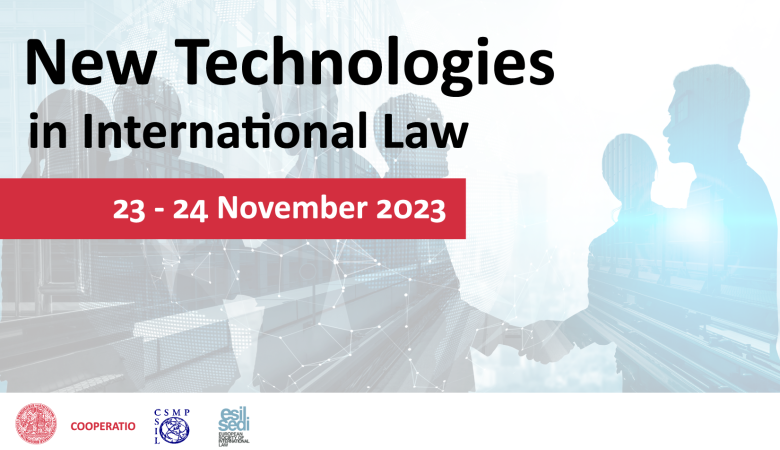 ESIL-Supported Conference on “New Technologies in International Law” in Prague
ESIL-Supported Conference on “New Technologies in International Law” in Prague
On 23 – 24 November 2023, the International Law Department of the Faculty of Law, Charles University and the Czech Society of International Law (CSMP-CSIL) is organising an ESIL-supported conference on New Technologies in International Law. The event will provide an opportunity to present the latest work related to the impact of new technologies on different areas of public international law (international humanitarian law, international criminal law, human rights, international economic law, international space law, etc.). Further information can be found here.
5. ESIL Early-Career Network
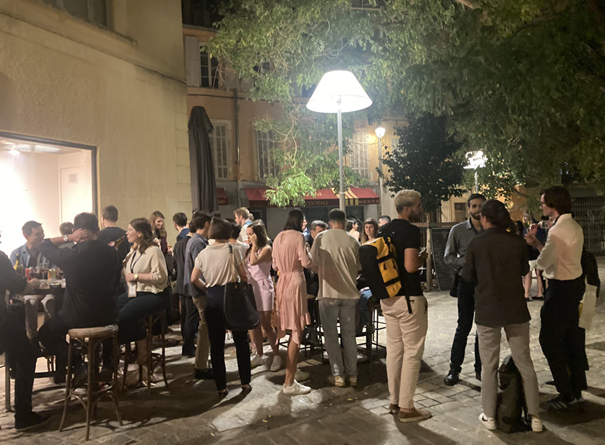 At the 2023 ESIL Annual Conference in Aix-en-Provence, the co-ordinating committee of the ESIL Early-Career Network, represented by Matina Papadaki and Silvia Steininger, presented the results of the ESIL Early-Career survey and committee’s future plans.
At the 2023 ESIL Annual Conference in Aix-en-Provence, the co-ordinating committee of the ESIL Early-Career Network, represented by Matina Papadaki and Silvia Steininger, presented the results of the ESIL Early-Career survey and committee’s future plans.
The ESIL Early Career co-ordinating committee also hosted the second edition of the ESIL Early-Career social event. More than 85 participants joined at Le Vieux Tonneau in a lively atmosphere to know each other on a peer-to-peer level and in a more informal setting. The ESIL Early-Career social events will continue at future ESIL annual conferences and research fora.
With the support of the ESIL Board the Committee also launched the first edition of the ESIL Early-Career Mentoring Programme. The year-long programme aims at building a close-knit network inside the broader ESIL community which will facilitate closer engagement between early-career and established ESIL members as well as complement existing activities for early-career ESIL members. The programme received 125 applications. This year 17 groups were matched for the starting phase and 21 groups are in the building-on phase.
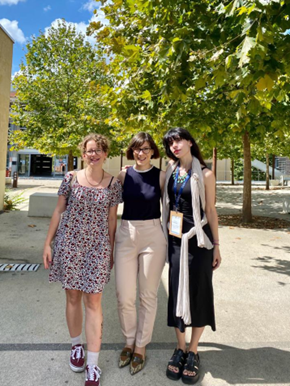
Veronika Fikfak continues her role as coordinator of the Early-Career Network and serves as a liaison with the ESIL Board. The committee would like to thank the previous liaison officer Neha Jain for her guidance, advice and encouragement during the initial stages of the ESIL-ECR Network activities. Now steps have been taken to institutionalise the representation of ECR interests and needs in crucial discussions and initiatives, such as ESIL’s greening efforts, planning on the future of ESIL, anti-harassment policies and future ESIL research fora and annual conferences.
(In the picture on the right: Silvia Steiniger, Veronika Fikfak and Matina Papadaki, 2023 ESIL Annual Conference)
6. ESIL Paper Series
The ESIL Paper Series features papers presented at ESIL events (Annual Conferences, Research Forums, and Interest Group events). Publication in the ESIL Paper Series enables authors to disseminate their work widely and reach broader audiences without the usual delays involved in more traditional means of publication. It does not prevent the subsequent publication of papers in academic journals or edited collections.
The current Series editors are ESIL Board members Adriana Di Stefano, Federica Paddeu and Catharine Titi.
ESIL Papers will be included in the EUI CADMUS Research Repository. The Papers presented at the 2022 ESIL Annual Conference in Utrecht are now available! These follow the previous ones presented at the 2022 ESIL Research Forum in Glasgow, at the 2021 ESIL Annual Conference in Stockholm and at the 2021 ESIL Research Forum in Catania. The papers presented at the 2023 ESIL Research Forum in Tartu will be available soon.
For any enquiries or if you are interested in publishing in the ESIL Papers Series, please email esil.papers@gmail.com.
NOTE: Papers presented at ESIL Conferences from 2011 to 2019 can be downloaded here.
7. ESIL Reflections
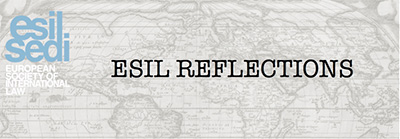 ESIL Reflections offer up-to-date reflections on current issues in international law. The Reflections cover a wide range of topics relating to current developments in international law and practice as well as theoretical reflections in a way that is relatively accessible to non-experts. The aim is to foster discussion between ESIL members and international law scholars and practitioners more generally – in Europe, but also beyond. ESIL Reflections are published on this website and distributed freely to ESIL members.
ESIL Reflections offer up-to-date reflections on current issues in international law. The Reflections cover a wide range of topics relating to current developments in international law and practice as well as theoretical reflections in a way that is relatively accessible to non-experts. The aim is to foster discussion between ESIL members and international law scholars and practitioners more generally – in Europe, but also beyond. ESIL Reflections are published on this website and distributed freely to ESIL members.
In March 2023 a new editorial board took over. The new editors are Patrycja Grzebyk (editor-in-chief), Lucas Lixinski, Alina Miron, Anne Saab and Peter-Tobias Stoll.
ESIL Reflections are short papers (3,000-4,000 words) that argue one particular point that may trigger further debate in the scientific community. Extensive referencing is to be avoided; references are only necessary in case of direct citations or when new or less well-known works are mentioned.
ESIL Members who have an interest in contributing are encouraged to do so. Please contact Patrycja Grzebyk (patrycja.grzebyk@uw.edu.pl) if you would like to contribute.
Copying and reprinting of ESIL Reflections is permitted with due acknowledgement. In such instances, please state: (parts of) this article first appeared as an ESIL Reflection (volume x, issue x), published by the European Society of International Law, www.esil-sedi.eu.
Latest publication:
- Framing Europe in Human Rights, Framing Human Rights in Europe: Authoritarianism, Migration, and Climate Change in the Council of Europe by Esra Demir-Gürsel and Jens T. Theilen
8. News from Interest Groups
 ESIL Interest Groups are a vital part of the Society’s success and activities. A list of the groups is available on the ESIL website.
ESIL Interest Groups are a vital part of the Society’s success and activities. A list of the groups is available on the ESIL website.
[NEW] Interest Group on Energy and International Law
A new ESIL interest group was created in September 2023 on “Energy and International Law“.
The three appointed conveners are Elena Cima, Ilaria Espa and Alessandro Monti. Stay tuned for more info coming soon!
To join the recently-formed group, make sure you have ticked the box next to this IG in the list of groups on your online membership account.

